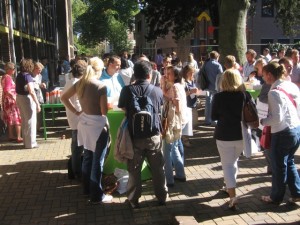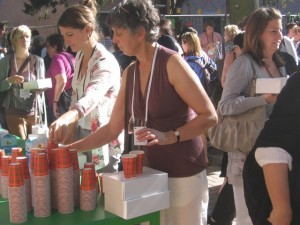Thursday and Friday proved to be very busy when Philosophy4Children went international. We flew to Holland to take part in the Dutch International Schools Conference held at the International School in Hilversum. Keynote speakers on Friday were JoAnn Deak, educator and psychologist speaking on Differentiation by Stretching and Growing Children’s Brains and Frank Furedi, professor of Sociology at the University of Kent who spoke on The Risks of the Pedagogy of Differentiation. There were over 1,000 delegates from across Holland – the atmosphere was buzzing! We ran two workshops, both were full to capacity, and had a great mix of teachers – both primary and secondary, philosophers, school governors and managers. We were impressed with the energy and enthusiasm of all those involved and, as always, Dot and I enjoyed ourselves immensely!
Author Archives: Barbara Vidion
-
-
I wasn’t sure … I am now!
“I was not sure about the “wee” ones (year 3) being capable of embracing philosophy, but I am now!” This was one of the comments from a teacher following an INSET day in North Norfolk last week.
It is always exciting to see Philosophy4Children embraced with enthusiasm. This was certainly the case when we worked with staff at Beeston Hall School. Our training is experiential and gives everyone a chance to take part in a philosophical enquiry – to experience what the children will experience, what better way to learn!
Here are a few other comments following the session:
“It allows for deeper thinking and reflection for all…”
“I can see how it helps to develop a culture of no right / wrong way and of respecting others’ opinions”
“It helped me to think more widely and I could see how it would help the children too. Not too much to listen to and plenty of time for input and thinking.”
It was a pleasure to work with such an enthusiastic group of teachers. I’m sure children at Beeston Hall will have an exciting time with philosophy over the years to come!
-
No-one knows!!
See what this group of Y3 and Y4 children have to say. They started with the question Why Do We Exist? This is a tiny piece of a fascinating enquriy!
Lydia: People say the first people were cave men, but they were just normal people – cave men are nothing to do with why we are alive.
Jack: I disagree with you Lydia. If cavemen aren’t anything to do with us…
Lydia: What I mean is they weren’t the first people in the world. No-one knows who was the first.
Kara: Well, most people think Adam and Eve were the first people on earth. But, no-one knows for sure.
Emily: But Kara, to know whether Adam and Eve were the first, we have to know how they were created.
Lydia: But how can we find out? Books weren’t written then.
Kara: People in the future might be able to find out, but we never will.
-
Food for thought
“Many thanks for yesterday. I thought it went very well and has given us much food for thought.” This is the response from our latest training session. On Monday Philsophy4Children returned to London to work with a great group of teachers in Eltham. We had a very stimulating philosophical enquiry using the book The Giving Tree by Shel Silverstein (ISBN 0-060256626). This book is excellent as it always raises a variety of issues. Monday was no exception. We explored whether humans are misusing the planet; what the nature of giving is; the existence (or not) of God; the concept of Mother Nature plus much more. Indeed, a lot of food for thought!
-
What will the children get from philosophy?
Philosophy4Children travelled to Dudley, just outside Birmingham last week. The twilight session with staff from 3 local primary schools finished with a philosophical enquiry. I was asked by one of the teachers “Our thinking has gone really deep with this – what will the children get from philosophy?” The answer came the following morning when we worked with Year 2 and Year 6 to deliver demonstration lessons. The children were stunning, their thinking was just as deep and they explored (amonst other things) the meaning of love and the existence of God, they were much more able to think “outside the box” and were extremely keen to explore ideas and challenge each other. Here is some of the feedback we got “the session with the children was of particular interest as they were clearly more relaxed than the adults.” ” An extremely useful session. Good to see how children can develop, think and speak when given the chance… I expect it to aid me in my attitude towards the children as well as helping them. Of course I’ll use it.”
-
Philosophy on Radio 4
How exciting to hear of the importance of primary school philosophy on Radio 4 Woman’s Hour this week (27/10/10). A philosophy student at Warwick University talked about how her interest in philosophy started as a child when she explored questions such as “why am I me and not someone else” with her friend – showing how natural this thinking in children and how important it is to encourage and develop it. The two guests on the programme, Dr Angie Hobbs and Professor Helen Beebee had both seen philosophy with primary children at work “Absolutely inspirational” was the verdict of Dr Hobbs after witnessing 8 and 9 year olds in a critical thinking skills session led by SAPERE exploring the difference between wants and needs. “Marvellous, philosophy really teaches you how to think about things for yourself” was the comment from Professor Beebeee.
-
Feedback
When we delivered p4c today we took along an observer, this is her feedback after watching the session.
“Excellent presentation. I gained an enormous insight into the way in which children think. It helped me to evaluate my own practice as a teacher and review preconceived ideas that I have. Very thought provoking.”
-
Try Rdeainig Tihs
“I cdnuol’t blveiee taht I cluod aclaltuy uesdnatrd waht I was rdgnaeig. The phaonmnael pweor fo the hmuan mnid!” This was the starting point for our work today with two groups of gifted and talented young people (Y6, 7 and 8) at a summer school in Suffolk. This led to very animated thinking! One group explored the capacity of the human mind and what we mean when we speak of “self”. The second group puzzled over what language is and the conventions we have and how they have developed. Dot and I had a great time and our thinking was definitely stretched!
-
Philosophy4Adults
At Philosophy4Children we often work with groups of adults who are keen to explore how to use philosophy with children in their school. Last week we were delighted to work with quite a different group of adults who had no connection to a school at all. The Erasmus Foundation. in rural Suffolk, invited us to guide them through a philosophy session. They were interested to discover how philosophy could be integrated into their group and their meetings. We had a wonderful evening and were treated to a delightful supper into the bargain. We are beginning to see many possibilities of using philosophy beyond schools!
-
A day in the classroom.
Following the staff training we did at the school in Norwich, we returned a week later to carry out demonstration philosophy4children lessons throughout the school. Dot and I were delighted to find that some teachers, during the week between our visits, had run a philosophical enquiry with their classes!
We had a great day in the eight classes (Years 3 to 6). Children, teachers and support staff were all very enthusiastic, here are some of the staff comments:
“It allowed me to see a teachable structure with a class, how time needs to be given for pupils to formulate their answers, how children respond to each other and their ideas.”
“Excellent modelling of flow of a session. It allowed me to pay attention to the class and listen to their ideas.”
“Clear expectations set out to the children. I liked the content and the re-focusing techniques and questions”
“It helped children to think about their behaviour and how they should talk to each other.”


